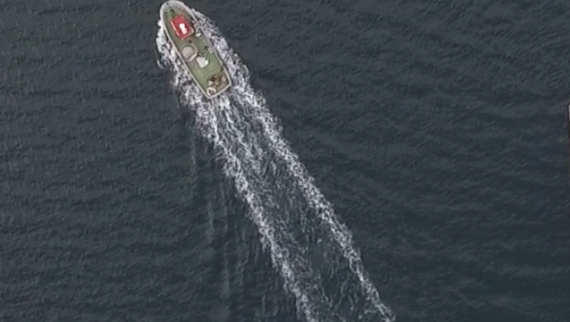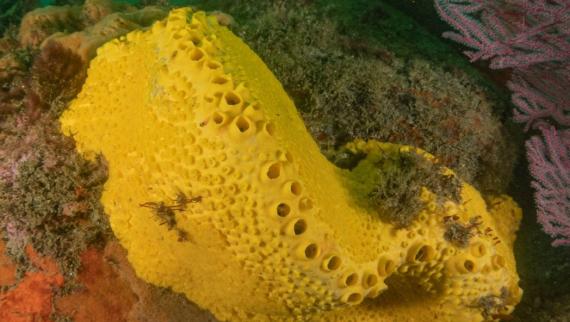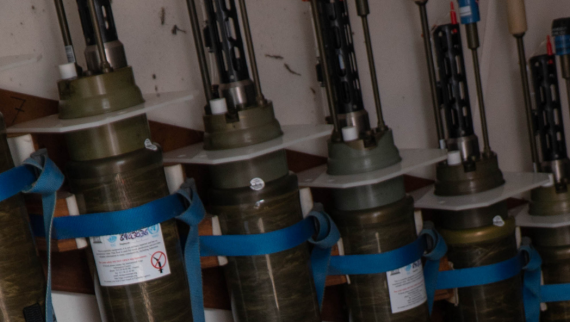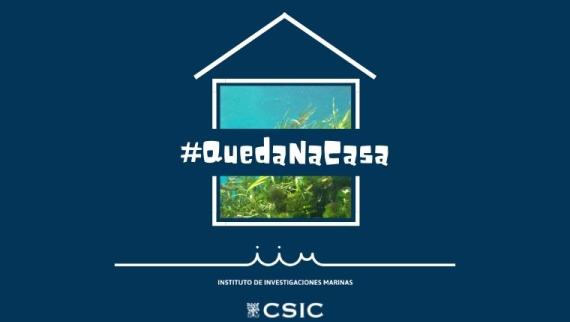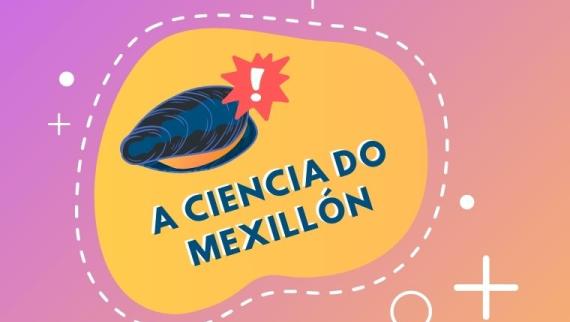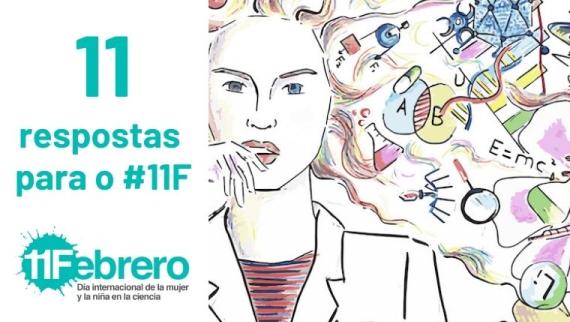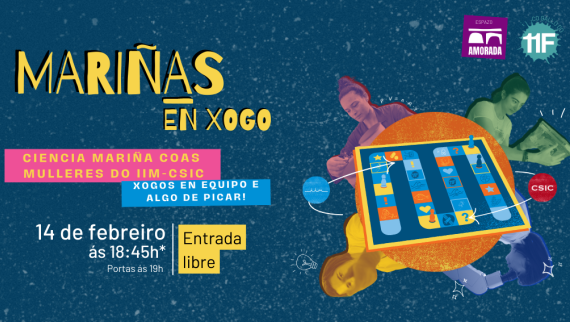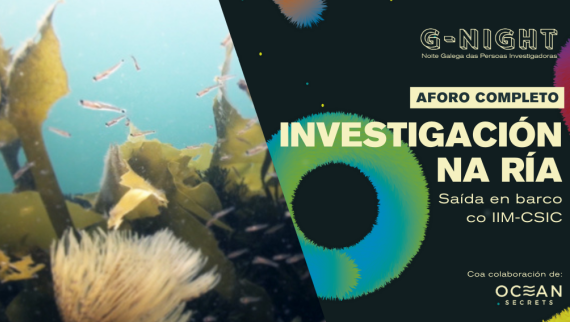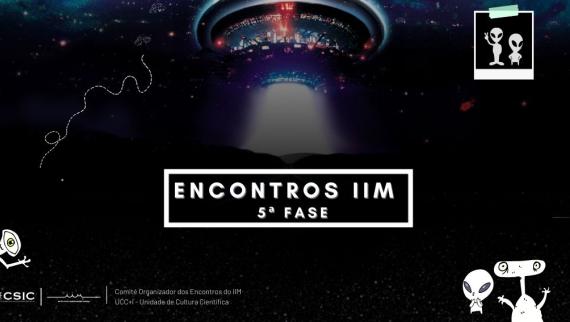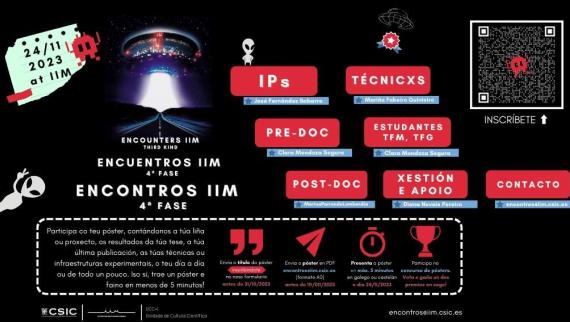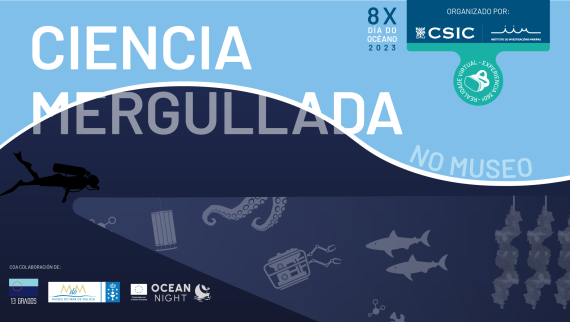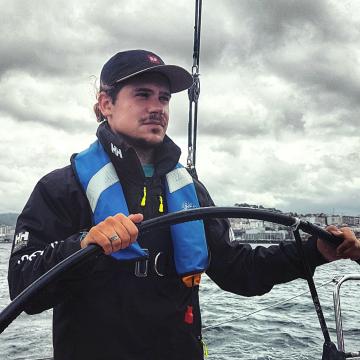Oceanic Processes in Global Change
According to the IPCC (2019), since the 1970s, the ocean has absorbed more than 90% of the excess heat from the Earth's system, as well as between 20% and 30% of the CO2 emitted by humans into the atmosphere since the 1980s.
A comprehensive study of ocean-mediated processes is fundamental to understand, monitor and mitigate the effects of global change.
The Ocean Processes in Global Change research group applies a multidisciplinary approach to oceanography from a physical, chemical and biological perspective. The group addresses the observation, experimentation and modeling of evidence and impacts of marine ecosystem warming, acidification, fertilization and deoxygenation in response to global change, both on the NW coast of the Iberian Peninsula and in the surrounding ocean.
On the one hand, the group studies marine biological and geochemical processes, with special emphasis on coastal upwelling systems, especially the Iberian-Canary Islands system, and on the thermohaline and chemical evolution of ocean water bodies. It is also immersed in the study of the biological and biochemical characterization of phytoplankton, the production of phytoplankton toxins and the dynamics of microbial communities in a changing ocean like ours.
On the other hand, it explores exchanges between the atmosphere, oceans and land, as well as the effects of human society on the marine environment and climate. Within this field, the group studies the role of oceans in the dissolution of excess atmospheric CO2 and ocean acidification as one of its main consequences. It also researches sediment exchanges between the substrate and the water column and their implications for regeneration processes of both the seabed (benthic zone) and the water column itself (pelagic zone).
- MoMeNTo -
Monitorización en tiempo real del cultivo de mejillón en batea: Herramientas para una gestión flexible y resiliente al cambio climático
Principal investigator:Funding body:Este proyecto se desarrolla con la colaboración de la Fundación Biodiversidad, del Ministerio para la Transición Ecológica y el Reto Demográfico, a través del Programa Pleamar, y se cofinancia por la Unión Europea por el FEMPA (Fondo Europeo Marítimo, deFunding for IIM-CSIC:298806€Go to project pageFromto - REDEIRA -
<p>Investigacion, desarrollo e Innovación de una Red de Observación Costera: Ría de Arousa</p>
Principal investigator:PadínÁlvarezJosé AntonioFunding body:Ministerio de Ciencia e InnovaciónFunding for IIM-CSIC:€Go to project pageFromto - DISPERSA -
<p>Programa Ciencias Mariñas: Modelo bio-físico numérico de dispersión larval de moluscos bivalvos nas augas galegas.</p>
Principal investigator:GilCotoMiguelFunding body:El Programa de Ciencias Mariñas de Galicia es 1 de los 5 programas de Ciencias Marinas de los Planes Complementarios de I+D+I del Plan de Recuperación Transformación y Resilencia. Financiado por FEMP/FEMPA.Funding for IIM-CSIC:92000€Go to project pageFromto - IMTA -
<p>Programa Ciencias Mariñas: Acuicultura multitrófica Integrada</p>
Principal investigator:PintadoValverdeJoséFunding body:El Programa de Ciencias Mariñas de Galicia es 1 de los 5 programas de Ciencias Marinas de los Planes Complementarios de I+D+I del Plan de Recuperación Transformación y Resilencia. Financiado por FEMP/FEMPA.Funding for IIM-CSIC:114486€Go to project pageFromto - AUTOGEN -
<p>Programa Ciencias Mariñas: Xenómica aplicada á monitorización do ecosistema</p>
Principal investigator:SaboridoReyFranFunding body:El Programa de Ciencias Mariñas de Galicia es 1 de los 5 programas de Ciencias Marinas de los Planes Complementarios de I+D+I con las CCAA del Plan de Recuperación Transformación y Resilencia (NextGenerationEU).Funding for IIM-CSIC:149652€Go to project pageFromto
- Bieito Fernández Castor; Marian Peña; Enrique Nogueira; Miguel Gilcoto; Esperanza Broullón; Antonio Comesaña; Damien Bouffard; Alberto C. Naveira Garabato; Beatriz Mouriño-Carballido (2022) Intense upper ocean mixing due to large aggregations of spawning fish Nature Geoscience DOI:10.1038/s41561-022-00916-3
- Sánchez-Jerez, P.; Babarro, J.M.F.; Padin, X.A.; Longa Portabales, A.; Martinez-Llorens, S.; Ballester-Berman, J.D.; Sara, G.; Magano, M.C. (2022) Cumulative climatic stressors strangles marine aquaculture: Ancillary effects of COVID 19 on Spanish mariculture Aquaculture DOI:10.1016/j.aquaculture.2021.737749
- González, J.; Fernández, E.; Figueiras, F.G. (2022) Assessing the effect of oil spills on the dynamics of the microbial plankton community using a NPZD model Estuarine, Coastal and Shelf Science DOI:10.1016/j.ecss.2021.107734
- N. MARBÀ; M. COLL; A. CALBET; A. SABATÉS; A.F. GONZÁLEZ; C. MARRASÉ; D. MACÍAS; E. SAIZ; E. MACPHERSON; E. GARCÉS; F. TOMÀS; F. GÓMEZ-FIGUEIRAS; H. HINZ; I. CATALÁN; I. HENDRIKS; J. AGUZZI; J. NAVARRO; J. TERRADOS; J.L. PELEGRÍ; J.M. GASOL; J.M. GILI; M. MALDONADO; M.M. SALA; M. ESTRADA; J. ALÓS; P. OLIVAR; R. SIMÓ; R. LOGARES; R. MASSANA; S.G. ACINAS; T. ALCOVERRO; X. TURÓN; X.A. ÁLVAREZ-SALGADO (2021) Challenge 3: Achieving a Resilient Ocean " Ocean Science Challenges For 2030" Consejo Superior de Investigaciones Científicas
- Jesús Marco de Lucas; M. Victoria Moreno-Arribas; Ananda Pascual; Diego Macías; Joaquín Tintoré; Antonio Turiel; Joaquim Ballabrera; Carmen G. Castro; Núria Marbà; Marta Coll; Jordi Dachs; I. Emma Huertas; Valentí Sallarès; Ángel F. González; Antonio Tovar-Sánchez; Carolina Gabarró; Javier Ruiz; Alejandro Orfila; Ramiro Logares; Josep Alós; José Pintado Valverde; Ana Crespo Solana (2021) White Paper 13: Ocean Science Challenges For 2030 Consejo Superior de Investigaciones Científicas ISBN:978-84-00-10762-8
- PhD - DANIEL BROULLON DURAN (24/10/2022) Neural networks and the seawater CO2 system. From the global ocean to the Ría de Vigo Universidade de Vigo (UVIGO)
- TFM - Justine Roth (26/07/2022) Silica determination in Seagrasses: An analytical method validation for the ecological assessment Université de Lille
- TFG - Paola Rodríguez Bello (26/11/2021) Variabilidad del pico- y nanoplancton durante la época de afloramiento en la Ría de Vigo Universidad Rey Juan Carlos (URJC)
- TFM - Hugo Marques Feio (30/08/2021) Effectoftemperatureandsedimentdisturbanceonecophysiologicalresponsesoftheinfaunalclam Polititapes rhomboides Université de Nantes
- TFM - Miguel Ángel Gutiérrrez Guerra (27/07/2021) Eastern Boundary Upwelling Systems under climate change Universidade de Vigo (UVIGO)
<p>Análise dos parámetros ambientais da Ría de Vigo e a súa influencia na abundancia de colonias de organismos procariotas intracelulares, simbiontes habituais na branquia de ameixa rubia</p>
Principal investigator:GilCotoMiguelVillacierosRobineauNicolasFunding body:CIMA-Xunta de GaliciaFunding for IIM-CSIC:14920€Go to project pageFromto<p>Protocolo de seguimento de bancos de ameixa rubia (Venerupis rhomboides) na Ría de Vigo</p>
Principal investigator:GilCotoMiguelVillacierosRobineauNicolasFunding body:Consellería do Mar - Xunta de GaliciaFunding for IIM-CSIC:14920€Go to project pageFromto
- Capabilities | Biodiversity AssessmentMarine instruments & sensors Coastal & Environmental Protection Maritime Spatial Planning Ecosystem Services & Governance
Monitoring temporal and spatial distribution of species, abundance and biomass from several taxa using different techniques such as e-DNA, pigment characterization, flow cytometry, acoustic telemetry, images collected from remote observation systems (i.e. drones, etc.) or classic taxonomic identification.
- Capabilities | Development of management and decision-making tools based on modeling and simulated scenariosCoastal & Environmental Protection Maritime Spatial Planning Ecosystem Services & Governance Aquaculture Fisheries
Development of space-specific tools for assessment, management and decision-making by modeling the impacts of present and possible future environmental scenarios (pollution, climate change, etc.) on oceanographic conditions, biodiversity distribution, physiological response or fisheries and aquaculture performance.
- Capabilities | Technical assistance in oceanographic and coastal sampling, data processing and interpretation
Technical assistance in sampling design and sensor selection for the collection of observational data on physical and biogeochemical processes in marine environments, as well as in data processing, modelling and interpretation.
- Capabilities | Geochemical characterization of water
Analysis of water properties, ranging from physical to geochemical characteristics, including carbon system components, nutrient concentration, organic matter characterization, radioisotope concentration, trace and rare earth elements (REE), etc.
- Capabilities | Prediction and characterization of harmful algal blooms
Characterization and modeling of algal blooms and their interaction with oceanographic and environmental conditions to model and predict proliferation episodes.
- Prototype | MUSSEL-HFNI: high-frequency non-invasive (HFNI) low-cost biosensor for aquaculture monitoring
Device to monitor the physiological status of up to 64 bivalves in their culture system in real time.
The monitoring system is based on the analysis of micro-movements of bivalves related to valve opening (valvometry). This technique has been confirmed by recent studies as a very promising technique to detect harmful algal blooms or ocean acidification episodes.
The prototype is being adapted to increase its portability and autonomy. For further information, please contact us by e-mail.
- Prototype | SURCOM-pH: Low-cost sensor for autonomous ocean acidification monitoring
Prototype of a low-cost autonomous pH sensor based on ISFET (ion sensitive field effect transistor) technology adapted for continuous ocean monitoring.
The sensor yields a high precision (± 0.003 pH units) and a very low measurement drift, provides real-time coastal data transmission, and its autonomy allows for over one year of continuous transmission.
The prototype has been tested for long periods in coastal areas and has been calibrated against commercial sensors, providing very good reliability. For further information, please contact us by e-mail.
- Window to the seaMarine instruments & sensors Coastal & Environmental Protection Ecosystem Services & Governance Maritime Spatial Planning
Interoperable data platform that collects records of a variety of indicators related to coastal risks both in Galicia and in the North of Portugal The variables include, among others, the risk of eutrophication, coastal erosion, flooding or loss of genetic diversity. Linked to the MarRisk project, financed by the European Regional Development Fund ERDF through the Interreg V-A Spain-Portugal Program (POCTEP) 2014-2020.




